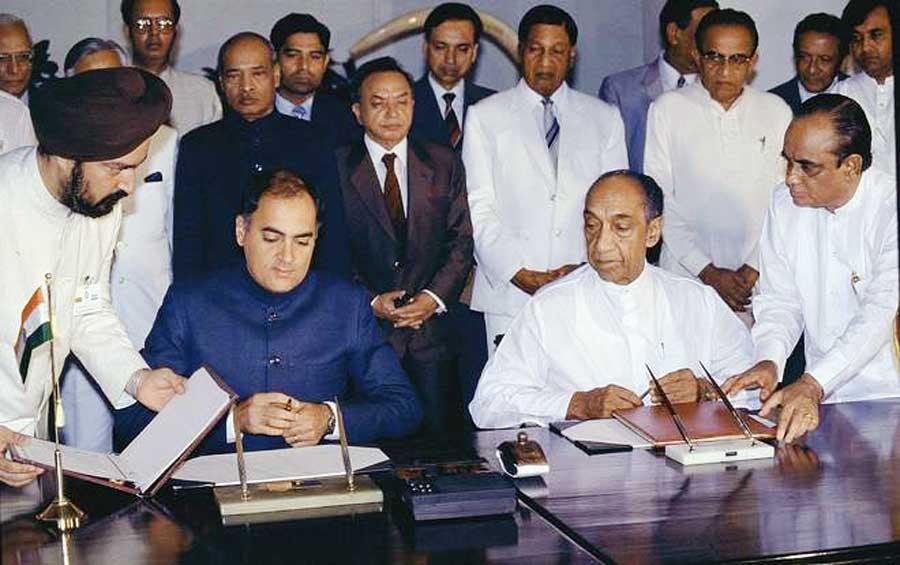Reply To:
Name - Reply Comment

Critics say that devolution of power has already been achieved through the local bodies which go right down to the Pradeshiya Sabha level satisfying all the Sri Lankans
Devolution of power is still a significant concept for resolving the national question but it must arrive at a viable unit of devolution
The idea behind the PC system was that power devolution will address some of the grievances of people in North and East
 Chairman Tamil National Action Group
Chairman Tamil National Action Group
It 32 years since The Indo-Sri Lanka Peace Accord was signed in Colombo on July 29, 1987, between Indian Prime Minister Rajiv Gandhi and Sri Lankan President J.R. Jayewardene amid political turmoil in Colombo and military advances in the North. Because it was signed by two Heads of States it could be considered an international agreement between two countries. The Accord was signed acknowledging the imperative need of resolving the historically unsettled ethnic conflict in Sri Lanka, the consequent violence and for the safety, welfare, good health, happiness, comfort, security, safety, protection and prosperity, of the people living in the pluralistic ethnic communities of Sri Lanka.
The 13th Amendment to the Constitution was the salient outcome of the Indo-Lanka Peace Accord. India’s Leadership then always took a keen interest, showing alert competence and clear understanding of the ethnic conflict and related developments in Sri Lanka, mainly because of the Tamil Nadu factor. The Tamil populace in Tamil Nadu and Sri Lanka’s North shared the same linguistic, cultural and religious heritage and it would have been unwary to suggest that the Central Government in New Delhi as well as the Tamil Nadu administration would take no interest in developments in Sri Lanka.
Direct involvement of India & the birth of the Indo-Lanka Peace Accord
There had been quite a bit of support for the militants among sections of Tamil Nadu politicians and the populace. The Indian Delhi establishment was sensitive to these sentiments. On the other hand, with the passing of time it so happened that the Sri Lankan Security Forces and their air attacks were on the offensive in the North recording very critical consequences. India could not wait any further and decided to intervene at this stage, resulting in the “Air Drop” of supplies over the Jaffna region on June 4, 1987. Delhi seemed to realise that some sections even at a national level in Indian politics were against the developing critical military operations in the North. Sri Lanka’s top leadership having analyzed the diplomatic aspects of India’s involvement resulted in the Sri Lankan government headed by President J.R. Jayawardane agreeing to an historical diplomatic solution, which came in the form of the Indo-Lanka Peace Accord.
The essential features of the Accord envisaging a political solution introduced the 13th Amendment to the Constitution and the Provincial Councils Act of 1987 along with the arrival of the Indian Peace Keeping Forces (IPKF) to Sri Lanka. The Sri Lankan troops were to be withdrawn to their barracks in the North and the LTTE cadres and other militant groups were to surrender their weapons. while the Army offensive in the North was halted.
At the end of the JR regime, Ranasinghe Premadasa became the President and he expressed his displeasure with the presence of the IPKF. One year later, the LTTE assassinated Indian Prime Minister Rajiv Gandhi in Tamil Nadu, which caused the people to ferment a hate psyche, even in Tamil Nadu. The LTTE was banned and India no longer extended support to the LTTE. Since then India did not oppose any of the offensives by Sri Lankan Security Forces, even that of the final battles in May 2009.
With the end of the war, the Indo-Lanka Peace Accord seemed to provide a starting point to the grievances for devolution of power. The idea behind the provincial council system was that power devolution would address some of the grievances faced by people in the North and East. Critics say that devolution of power has already been achieved through the local bodies which go right down to the Pradeshiya Sabha level satisfying all the Sri Lankans. Not only the leadership in the North and East, but even the other Chief Ministers of South are now asking for more powers. Devolution of power is still a significant concept for resolving the national question but it must arrive at a viable unit of devolution.
Therefore the southern politicians must be thankful to J.R. Jayewardene that in response to the historical grievances of Tamils he was able to convince Indian leader Rajiv Gandhi and together made the PC system available to the rest of the country. But I strongly believe that it was only “JR and Rajiv” through the Indo-Lanka Peace Accord have given us the last and final power devolution.